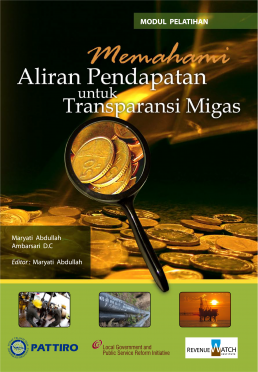Revenue Watch Institute (RWI) Understanding Revenue Streams for Oil and Gas Transparency” by PATTIRO, as an effort to encourage transparency and accountability in the oil and gas extractive sectoRr., welcomes the publication of the Training Module book in Indonesia. The presence of this book is an answer to the critical need of the public to understand the flow of income from the oil and gas sector.
For most countries rich in oil, gas, and minerals, oil and gas and mineral and coal revenues often show little benefit; the rich are getting richer, the poor are getting poorer, the economy is stagnant, corruption is rampant, and conflicts are deepening. Extractive industries bring enormous wealth to more than 50 countries worldwide, but many countries cannot turn this massive amount of money into long-term growth and increased equity for their citizens.
In the last decade, an international movement to fight this “resource curse” has begun to emerge. Citizens of producing and consuming countries are joining together to demand better and more responsible management of extractive natural resources. Now the extractive industry sector, which has traditionally been shrouded in secrecy and managed as the exclusive domain of the political elite and big companies, is opening its doors wider for public scrutiny. Civil society groups began to find ways to communicate effectively. A thing that is very important for the future of every resource-rich country.
The Revenue Watch Institute sees transparency of revenues generated by natural resources as a critical issue for development at both the national and regional levels. This program aims to support civil society efforts to produce and publish research, information, and advocacy in the extractive industry’ governance field” to encourage transparency and accountability of the government and extractive industry companies. RWI is also building the capacity of local groups to monitor government management of oil revenues and ensure that current and future natural resource revenues are invested and spent for the welfare of the people.
In Indonesia, RWI has supported several civil society organizations in promoting revenue transparency and accountability to improve extractive governance. It includes fighting for Indonesia’scommitment to becoming a country that will implement the EITI (Extractive Industries Transparency Initiative), which is marked by the birth of a presidential regulation regarding Transparency of State/Regional Revenues obtained from the oil and gas and Minerba extractive sectors. Until now, Indonesia has been registered as a candidate country that will carry out the EITI.
PATTIRO is one of the NGOs that, for the last three years, has been working with the support of RWI in two oil and gas-producing districts, namely Blora Regency and Bojonegoro Regency. Together with its partners, the Institute for Research and Application of Discourse (LPAW) and the Bojonegoro Institute (BI), PATTIRO is building multi-stakeholder initiatives for transparency at the local level and assisting in developing sustainable development plans for oil and gas-producing regions. This module is one of the outputs of PATTIRO’s work in this program.
Finally, this Training Module will serve as a reference for local governments, civil society organizations, and the general public in understanding revenue streams from the oil and gas extractive sector. Congratulations, we convey it to the writing team and readers, who are also expected to provide input for the improvements needed to perfect this module. The Revenue Watch Institute would also like to thank LGI (Local Government and Public Service Reform Initiative) for supporting this book’s publication.

Author: Maryati Abdullah, Ambarsari DC
Cover Desaign & Layout: Agus Wiyono
Publisher: PWYP Indoensia
Year: 2010
ISBN: 978-979-18481-5-2
Download: Google Drive – PDF